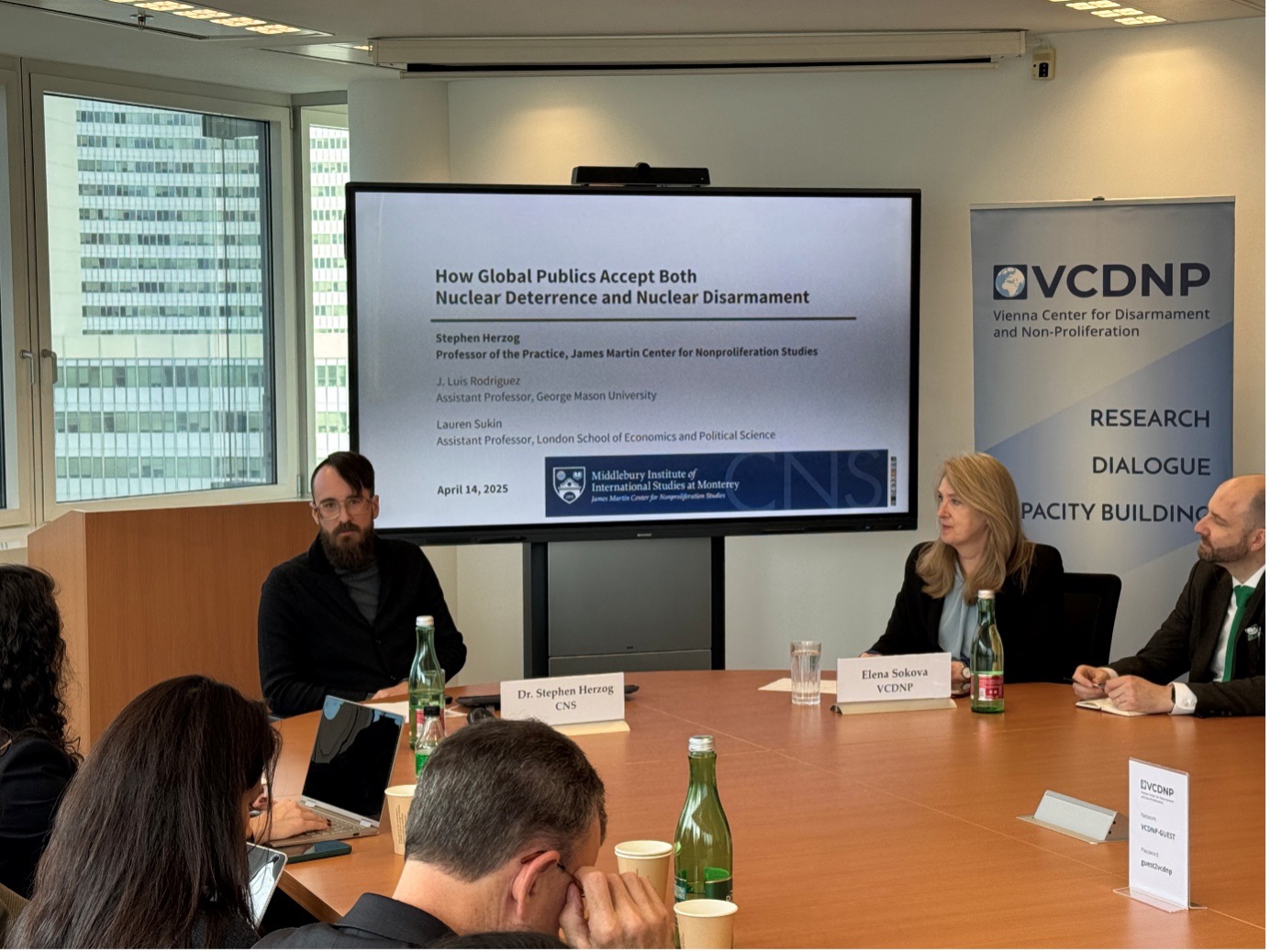On 14 April 2025, the VCDNP hosted a seminar featuring Dr. Stephen Herzog, Professor of Practice at the James Martin Center for Nonproliferation Studies (CNS). VCDNP Executive Director Elena K. Sokova moderated the seminar.
Dr. Herzog presented findings from a global survey with more than 27,000 participants in 24 countries on six continents on their views on nuclear weapons. The research, co-authored with Dr. J. Luis Rodriguez (George Mason University) and Dr. Lauren Sukin (London School of Economics and Political Science), challenges conventional binary thinking about people’s preferences for nuclear disarmament versus reliance on nuclear weapons for defence.
Moving Beyond the Binary
In her opening remarks, Ms. Sokova observed that, in diplomatic and policy circles, the deterrence–disarmament debate is highly polarised, with positions on nuclear weapons presented as dichotomous. The data presented by Dr. Herzog challenges this narrative, suggesting that, for most people around the world, support for nuclear disarmament and support for possession and even use of nuclear weapons are not necessarily mutually exclusive.
Key Survey Findings
Dr. Herzog noted that the survey was conducted in summer 2023 in the context of heightened nuclear anxieties following Russia's invasion of Ukraine in February 2022, which led to a surge in global media coverage and research on nuclear weapons issues. The surveyed countries included nuclear-weapon States (NWS), nuclear weapon possessors outside the Treaty on the Non-Proliferation of Nuclear Weapons (NPT), non-aligned non-nuclear-weapons States (NNWS), and NNWS in military alliances with nuclear-armed States.
The study revealed several striking findings:
- Strong majorities support joining the Treaty on the Prohibition of Nuclear Weapons (TPNW) across all surveyed countries (68-85%), with minimal difference between the Global North and Global South.
- Only 31% of respondents support unilateral US nuclear arsenal reductions.
- In approximately one third of surveyed countries, a clear majority supports their government acquiring or expanding nuclear arsenals.
- While 65% consider nuclear weapons use morally unjustifiable, large majorities across all countries also support the United States using nuclear weapons in response to an attack on an ally.
Dr. Herzog introduced the concept of "strategic morality" to explain the seemingly contradictory public views. Rather than holding rigid ideological positions, he argued, individuals employ "preference management". That is, they prioritise reliance on nuclear weapons or disarmament based on context and perceived threats, remaining flexible when their preferred approach seems unattainable.
"It's not either/or, it's if/then for global publics", explained Dr. Herzog, noting that individuals view disarmament and reliance on nuclear weapons as valid means to manage security risks rather than as mutually exclusive ends. This helps explain apparent contradictions in previous studies, which found majorities simultaneously supporting nuclear weapon use in certain scenarios and global nuclear disarmament in others.
Policy Implications
These findings suggest that policy-makers should reconsider how they frame nuclear policy debates. "The binary in the literature between nuclear deterrence/strategy and nuclear disarmament/morality doesn't reflect preferences of global publics", Dr. Herzog emphasised. "Anti-nuclear morals and pro-nuclear strategic concerns are present across geographical boundaries."
By understanding how the public simultaneously embraces elements of both nuclear deterrence and disarmament thinking, policy-makers might find new paths toward addressing nuclear dangers that better align with public preferences.
This research offers valuable insights for multilateral disarmament forums and could help bridge divides between nuclear-armed and non-nuclear-armed states in international negotiations. As Dr. Herzog noted, "Nuclear morality is constrained, globally, by a persistent belief in nuclear deterrence" – a reality that effective nuclear policy must acknowledge and address.
The VCDNP thanks the Austrian Federal Ministry for European and International Affairs for its support for this seminar.

